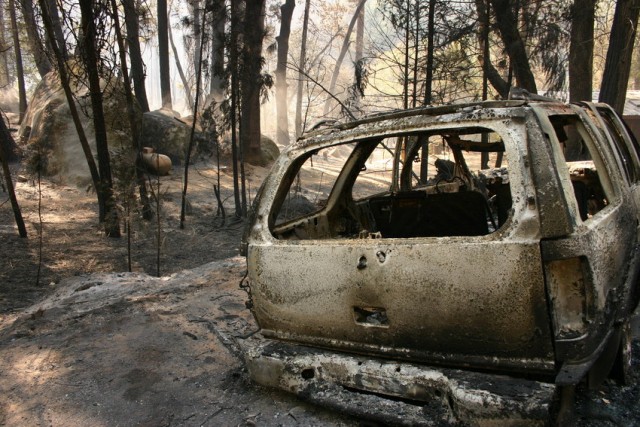ORENSTEIN: It really feels like we have lost a friend. You watch your child’s childhood up at camp, and you watch them hit these milestones of the camp culture and go through that. And to lose that feels just deeply profound and sad. And I know a lot of us, myself included, burst into tears when we heard that the camp burned down.
MARTIN: Talk about the camp's culture.
ORENSTEIN: There’s a tradition of family camp in the Bay Area. Berkeley camp was founded in 1922. It was $1 a day, and people would arrive in their silk stockings and their white shoes, and they would come up to camp. It was a response to increasing urbanization and our foggy, cold summers. And so San Francisco has a family camp; San Jose has a family camp; Oakland has a family camp; UC Berkeley has a family camp; Stanford has a family camp. It became a very popular Bay Area concept and tradition.
MARTIN: When you think about the camp, what kind of sensory experiences do you remember?
ORENSTEIN: I feel the icy cold of the Tuolumne River and the wonder of watching my daughter the first time she climbed up the slippery granite slope of Beaverhead Rock to jump in. And the feeling of sitting on the benches down in the arts-and-crafts shack, and doing lanyards and hemp bracelets, and having some 8-year-old teaching me how to tie this nifty little new hemp-stitch bracelet that I learned. And the warm piney smell of the summer forest up there.
And the iconic green Adirondack chairs that were right in the middle of camp. And the smell of dinner cooking that you didn’t have to cook yourself, which was one of the really wonderful things about camp -- the meals. And the feeling of lying under the stars on the porch of your tent cabin.
Just the beauty of being there. You slowed down and got into this rhythm and this wonder of being away from the devices. There was no electricity in most places. There was no cellphone service. There was no Internet service. So there was you and your thoughts and your family and your community, and it was just glorious.
Listen to an extended interview:

